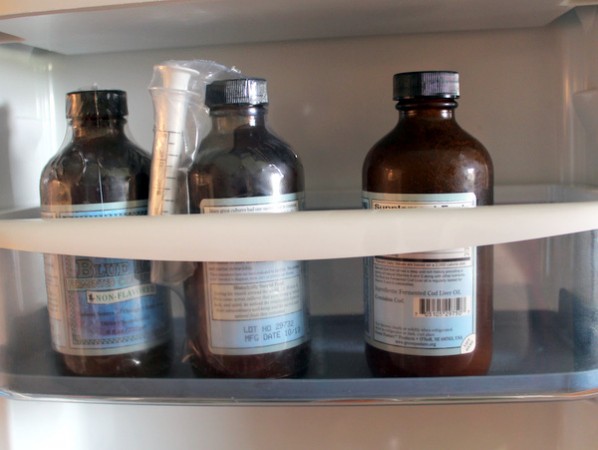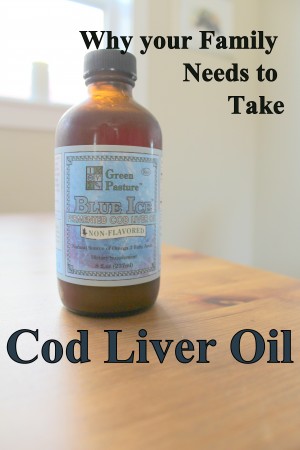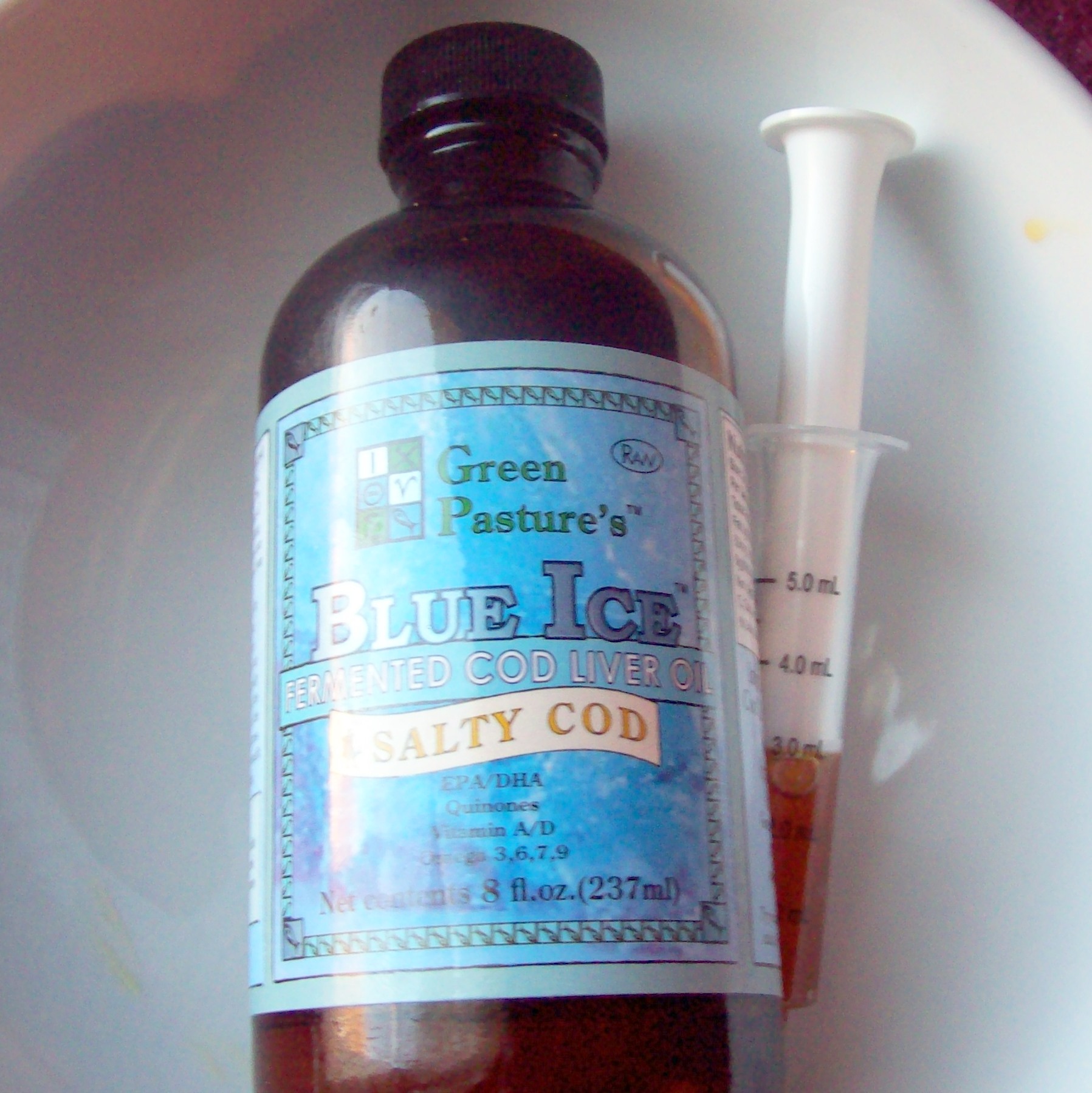
Why we take cod liver oil
The alarm goes off, the sleepy children are woken up by mama, they crawl out of bed. Sleepiness gives way to routine…beds are made, young bodies get dressed, hair is combed, lunches put in backpacks…
Amidst the morning flurry, a certain bottle of amber liquid comes out of the cupboard.
This amber liquid will come out most mornings – from early fall, through the frigid white mornings of winter, and well into spring when the bears are past crawling out of their hiding places.
What is this amber liquid that mother’s have been giving their kiddos for centuries?
Cod liver oil!
This is a guest post by Melanie Christner of Honest Body, which I’m thrilled to share with you because cod liver oil can do so much to prevent illness and seasonal effective disorder in our families this winter. The fat soluble vitamins present in it are naturally occurring and our bodies know just what to do with them, unlike the synthetic versions on the shelves at the pharmacy.
Melanie is super knowledgeable about nutrition, family health, and the GAPS Diet.
Though there are many beneficial factors in cod liver, both studied and unstudied, I want to focus on the fat soluble vitamins A & D. Next to sunshine, high quality cod liver oil is the best natural source of Vitamin D.
It is also an excellent source of Vitamin A, in a form that is easy for the body to absorb and use.
Cod liver oil is both food and medicine! I recommend Green Pastures Fermented Cod Liver Oil to all my clients and GAPS Class participants.
Cod liver oil is also one of the most important supplements in the GAPS Protocol, helpful for healing the digestive tract as well as the rest of the body. For information about registering for a class on GAPS -> click here.
So why are Vitamin A & D so important?
Vitamin A
Natural preformed vitamin A, consumed within a well balanced diet, alongside vitamin D, is a strong immune system modulator and is a contributing factor to dopamine regulation, one of our main neurotransmitters.
Vitamin A also regulates the female sex hormone progesterone, providing mood and fertility benefits. It acts as an antioxidant and it is important for skin cell regeneration, i.e. smooth, healthy skin. Dr. Amen, author of Change your Brain, Change your Body says that “your skin is ‘brain on the outside’.
Signs and Causes of Deficiency include:
- Zinc deficiency (zinc is important for the use of vitamin A)
- Infections are more severe (Vitamin A is very important to the immune system, in fact its earliest name was anti-infective vitamin)
- Infections also draw heavily on vitamin A reserves
- Deficiency in bile and pancreatic enzymes (lack of good fat metabolism)
- Decreased growth rate
- Poor bone development
- Decreased likelihood of survival from serious illness
- Depression
- Anxiety
- Lack of future goal motivation (may be due to lack of dopamine regulation)
- Digestive disease (According to Dr. Natasha Campbell-McBride, author of the Gut and Psychology Syndrome, Vitamin A and digestive issues are a bit of a “chicken and egg” relationship, one leading to the other and so forth, because the gut lining is one of the most active sites of cell production, growth & differentiation…which needs a good supply of vitamin A)
- Night blindness and xerophthalmia (rare in the West)
Sources for Vitamin A:
Vitamin A can be found in two main forms in foods – plant based carotenes and animal based retinol.
Due to digestive issues and lack of the right enzymes many people cannot convert plant based carotenes to the correct and usable form. Cod liver oil contains vitamin A in its natural pre-formed biochemical shape.
The best way to get bio-available Vitamin A is from good quality cod liver oil. I have recommended Green Pastures Fermented Cod Liver Oil because they have high quality processing methods, which is important for not destroying the nutrients that are inherently in the cod liver oil.
Sources of Vitamin A include:
- cod liver oil (fermented is best)
- liver (and other organs from grass-fed animals)
- fish (like cod & halibut)
- egg yolks (from pastured chickens)
- butter (from grass-fed dairy animals)
- fish eggs (roe)
Vitamin D
Vitamin D…where to begin? It goes by several names, like “sunshine vitamin”, but is actually not a vitamin at all. Rather it is a potent maintenance and repair steroid hormone. It is a neuro steroid and a powerful epigenetic influencer and is responsible for regulating over 2,000 genes in the body.
Vitamin D’s role in blood calcium levels plays a role in nerve transmission. Vitamin D is also important in preventing depression, mood disorders in general, and cognitive function.
Vitamin D taken in therapeutic amounts of 5,000 to 10,000 IU daily can dampen autoimmunity response. (Test your levels first and recheck in 4 – 6 weeks. Your level should be around 50 ng/mL).
Synthetic D halts natural D conversion in the body, so it is important to get natural Vitamin D, such as from sunshine and CLO. Sunshine is the most efficient way to get vitamin D…unless your diet is full of unhealthy pro-inflammatory fats and sugar. When you have healthy fat stores and cholesterol, UV rays hit the skin and strike cholesterol molecules, changing them into a precursor for vitamin D that gets fully activated in the kidney and liver. The best form of D to intake is D3.
Vitamin D is critical to overall health and important for brain health.
Signs of Vitamin D Deficiencies include:
- Diabetes, as Vitamin D is essential for blood sugar control
- Heart disease
- Mental illness
- Auto-immune illness, such as rheumatoid arthritis, lupus, inflammatory bowel disease, MS and others
- Obesity
- Osteoarthritis
- Rickets and osteomalacia, Vitamin D being so essential for bone health
- Muscle weakness and poor neuro-muscular coordination
- High blood pressure
- Cancer
- Chronic pain
- Poor immunity and susceptibility to infections
- Hyperparathryroidism, which manifests itself as osteoporosis, kidney stones, depression, aches and pains, chronic fatigue, muscle weakness and digestive abnormalities
It can be a good idea to test your vitamin D status. Although, unless you are a Miama beach guard (!) you can usually assume you have some deficiency today.
What test numbers are you looking for?
- If you are deficient in the 25 hydroxy D3 (inactive) you will show less than 40 – 50 nanograms (ng) per milliliter (ml.)
- If you are optimal you’ll show about 50 – 65 ng. per ml.
- If you show a greater than 100 ng per ml. this is truly an excess of Vitamin D
- Maintenance – 250 – 300 IU per day should be sufficient, for a person who is not deficient
- Therapeutic ranges – Normal, healthy person can safely consume up to 3,000 IU for every 100 lbs.
- Cancer or autoimmune patient – can consume up to 5,000 IU of Vitamin D per day
- Higher doses for short periods of time are okay, but it is wise to monitor levels
At the right time of year, with the optimal conditions, you can manufacture up to 20,000 IU per day from sunshine.
- If you have an acute situation like the flu, a viral infection, etc. you can treat with high amounts of Vitamin D – 1,000 IU per pound of body weight, for up to 3 days, no more than 4 days
- For most adults this equals up to 100,000 to 200,000 IU per day, in a single dose, for 3 days
- Do not do this for a person getting out in optimal sunshine
Best Sources for Vitamin D:
- Sunshine (with optimum health and optimum sun exposure, up to 20,000 IU a day)
- Cod liver oil (fermented & minimally processed is best, by far the most concentrated food source)
- Fish (salmon, sardines, cod, shrimp)
- Egg yolks (from pastured chickens)
- Lard (from pigs on pasture/woods)
How our family takes cod liver oil:
Our family takes cod liver oil in two ways.
- With elderberry syrup (our girl’s preferred method)
- With beet kvass (the rest of the family’s preferred method).
We could take it straight, and have indeed done so when needed, but it is much more pleasant to take it with something that cuts the taste!
General Dosing of Fermented Cod Liver Oil:
You can purchase Cod Liver Oil here from Radiant Life – I like to buy 3 at a time so that the order qualifies for free shipping.
For dosing purposes, 1/2 tsp is equal to about 2.5 ml.
Children (3months-12yrs): 1/8 – 1/2 tsp (0.625-2.5ml)
Adults and Children 12+yrs: 1/2 – 1 tsp (2.5-5ml)
Pregnant/Nursing Women: 1 – 2 tsp (5-10ml)
For more on dosing of capsules as well as FCLO blended with High Vitamin Butter Oil ( a great source of Vitamin K) please reference this article by Radiant Life.

Learn how to heal leaky gut

60-page ebook of all my best GAPS Diet (Gut and Psychology Syndrome) articles all in one place.



HI Melanie, my son used to refuse taking fermented cod liver oil, no matter how. Recently, I purchased Green Pastures’ coconut oil infused with cod liver oil (and skate oil, and high vitamin butter) and its milder taste blends much better with juice. I don’t normally give juice to my children, almost never, but I created an exception to help with the cod liver oil intake. I give my son the oil with a tiny amount of concord grape juice and now he begs for it… I’m so happy that this is working for us. No more cod liver oil battles around here!!! I like that this infused coconut oil also has the butter oil already mixed in as well, since according to Weston Price, it’s important to give the cod liver oil together with the high vitamin butter oil for a synergetic combination.
Do you know if this is ok to take if you have fructose malabsorption? My son is underweight and has GI issues from FM, I’m looking for something to help heal his gut and stumbled in this article. Do you know if this would help him?
This is dangerous advice! While taking cod liver oil (a food) is a good idea, Supplementation with vit. D in the amounts suggested here (100,000-200,000) is dangerous, even for a short time. Vit. D, is a hormone that the body produces, and we are not meant to ingest hormones. The human biochemistry is a very complex thing, so be aware that you can’t just take D if you’re low on D. First, the healthy levels of D are being blown out of proportion by the vit. D council (Chris Kresser has a blog post on this). Second, vit. D requires many cofactors if ingested, none of which contained in vit. D drops. Third, since D production is endogenous, there is a reson that your body may be underproducing, and that needs to be addressed.
Two years ago, 10,000 IUs a day of vit.D put me in the hospital. I was low on D (29),so primary care prescribed D3 drops for a month. This caused my potasium to crash which led to atrial fibrillation. I didn’t link the two together until the person who runs the Magnesium Advocacy Group on FB correctly predicted this course of events following vit. D supplementation.
Do you also recommend taking skate liver oil along with cod? I can’t seem to figure out how much cod liver oil/skate liver oil/butter oil and coconut oil to take each day. Thanks for any advice!
My nutritionist recommends refrigerating cod liver oil, then just swallow it like you would a pill. There’s almost no taste and it goes down easily
Do you still recommend Green Pasture’s FCLO? I am pregnant and just bought 6 bottles of the FCLO/butter oil blend but now am concerned about the claims that it is rancid. Would love your opinion. Do you still take it?
Thanks!
Sarah
I have recently found that I am intolerant to histamines and avoiding fermented foods is suggested. I am also looking for a safe form of vitamin D and read your suggestion for the fermented cod liver oil. Would this product be possibly an issue with my intolerance to histamines?
Hi Connie, it very well could be an issue but its hard to say. It is fermented and for awhile I personally had to avoid histamines but I could tolerate fermented cod liver oil im small amounts. – Katherine